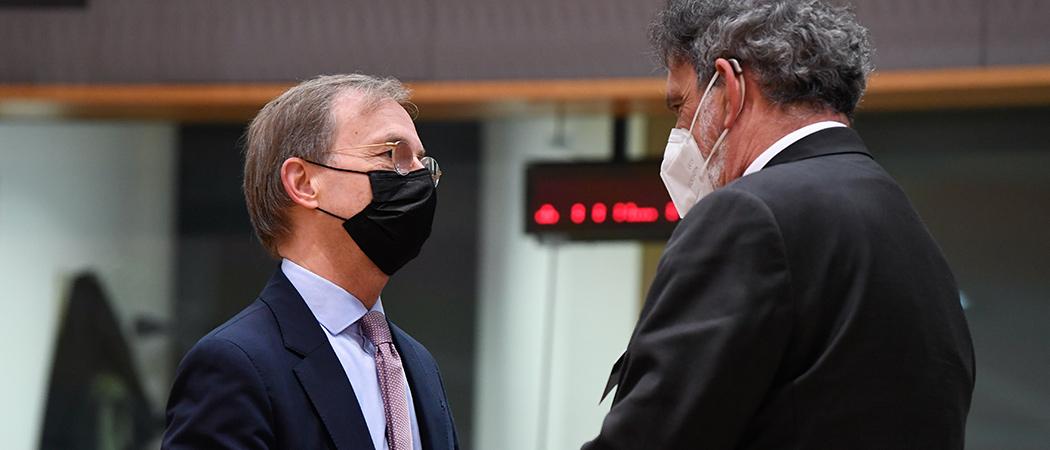Research ministers tell the Commission to make sure any new initiatives that involve taking money from Horizon Europe are first subject to political discussions within the EU’s formal decision-making process

Thomas Rachel, Germany’s state secretary for education and research (left), and Radovan Fuchs, Croatian minister for science and education at the Council meeting on Friday. Photo: European Union.
EU research ministers are unhappy with the way in which the European Commission is failing to consult member states on policy initiatives that route money out of the Horizon Europe budget.
The Commission has recently spearheaded a number of initiatives that are slated to receive hundreds of millions of euros from the research and innovation programme. These include the EU energy partnership with the Bill Gates Breakthrough Energy initiative, the new Health Emergency Preparedness and Response Authority (HERA), and the European Bauhaus.
Member states were not given sufficient time to react to these proposals and assess whether Horizon Europe money would go to research and innovation activities in these schemes, EU research ministers complained during an EU Council meeting on Friday.
“Horizon Europe is a not an ATM or a piggy bank for measures which do not take member states’ needs into consideration,” said Thomas Rachel, parliamentary state secretary at Germany’s federal ministry of education and research.
The Commission and the European Investment Bank (EIB) recently joined the Bill Gates Breakthrough Energy initiative, in a €820 million deal to scale-up critical climate technologies developed in the EU and create markets for them. Some of the money needed to finance the deal will come from Horizon Europe.
HERA, the EU’s new health authority, is due to launch in 2022 with a dedicated budget of €6 billion up to 2027, of which €1.7 billion represents Horizon Europe’s contribution to research into health emergencies.
The Commission is also using Horizon Europe money to finance calls in the European Bauhaus, a plan to combine design and technology to build greener homes and offices.
EU research ministers said these initiatives may be needed but cried foul at the lack of transparency on the Commission’s side. “In order to ensure we have enough financial resources for Horizon Europe, we need to continue to have co-creation and co-design involving member states,” said Rachel.
EU research commissioner Mariya Gabriel attended the meeting on Friday but did not directly address the concerns raised by the ministers. Gabriel said the challenges set by the EU in its new climate law reflect the EU’s determination to significantly invest in new technologies and business models to reduce Europe’s carbon emissions by 2030. “It is only with a strong research and innovation policy at the heart of these initiatives that they will be able to bear fruit,” she said.
Portugal’s science minister Manuel Heitor said the EU should spend “all the funding from Horizon Europe on research and innovation and not allow it to be deviated to other activities.”
Cash cow
After the meeting on Friday, EU diplomats said the Commission has a tendency to come up with new ideas and sees the Horizon Europe budget as a convenient source of financing. Policymakers have introduced amendments in the Horizon Europe work programme without proper negotiations with member states in the “comitology” process, a series of meetings between the Commission and member states that ensures EU legislation is being implemented.
The Commission, member states and the European Parliament went through a tedious negotiation process on the Horizon Europe strategic planning, a policy guide that sets out the main areas the €95.5 billion research money should be invested in. Now, member states say the whole process could be called into question if the Commission continues to introduce new initiatives to be financed by the Horizon Europe budget.
In the case of the energy catalyst announced with Bill Gates at the Glasgow climate conference, the Commission presented the plan to member states in one of their regular Horizon Europe programme configuration meetings, but some diplomats felt uncomfortable with the urgency of agreeing to approve the deal.
French minister for higher education, research and innovation Frédérique Vidal said member states are not against new ideas. However, “these initiatives [should] be discussed as early as possible with the member states,” Vidal said.
Ireland, Finland and the Netherlands have also called on the Commission to make sure all new initiatives that involve taking money from Horizon Europe should be the subject of political discussions within the EU’s formal decision-making process.





 A unique international forum for public research organisations and companies to connect their external engagement with strategic interests around their R&D system.
A unique international forum for public research organisations and companies to connect their external engagement with strategic interests around their R&D system.